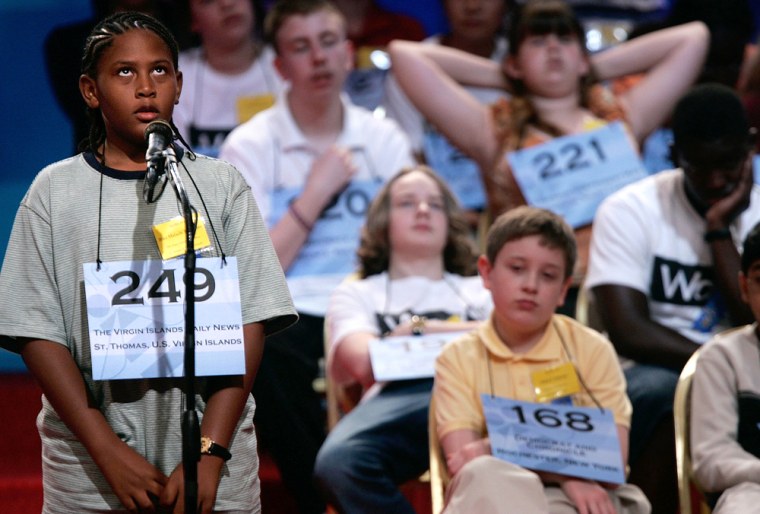After more than three rounds of spelling such words as “spheterize,” “ibidem” “lipogrammatism” and “obstreperous,” 46 elementary and middle school students remained standing Wednesday at the end of the first day of tense competition in the annual National Spelling Bee.
The winner will be crowned Thursday night on national TV.
Scores from a 25-word written test and a round of spelling into the microphone were used to narrow the field of 274 fourth-graders through eighth-graders to the top 97 spellers.
From there, 51 spellers stumbled on such words as “putative,” “boswellize,” “opeidoscope” and “jacamar,” and knew it was over at the telltale sound of the bell that signifies a mistake.
After hearing the word spelled correctly, they were quickly escorted off the elaborate, red-carpeted stage to a “comfort room” to be consoled by relatives in private.
As if the contest to be crowned America’s best speller wasn’t intense enough, this year it includes the first live, prime-time network broadcast of the finals, from 8 p.m. to 10 p.m. EDT Thursday on ABC.
The winner goes home with more than $42,000 in cash and prizes.
Round 4 was halted midstream, just as the number of spellers who qualified for the next round reached 46, but also with 13 contestants who had yet to spell.
Just missing the cut
Unfortunately for 12-year-old Samir Sudhir Patel, it came just as he stepped to the microphone.
“Did it have to be me?” Samir, a seventh-grader who is home-schooled in Colleyville, Texas, asked a bee official afterward. Last year, Samir tied for second place.
Bee director Paige Kimble said the spelling marathon was halted mid-round so there would be enough spellers for Thursday’s live broadcasts, in the afternoon on ESPN and later on ABC.
The goal is to have about 10 spellers for the prime-time event.
Competition resumes Thursday at noon EDT on the sports cable network.
Spellers range in age from 9 to 15, and are in grades four through eight. Among them is Bonny Jain, a 12-year-old from Moline, Ill., .
‘Can you repeat the word please?’
During the competition, the spellers sit on the red-and-blue stage, some deep in concentration with heads bowed or resting in their palms. Others yawn, look up at the ceiling, chat with seatmates or watch intently as spellers approach the microphone and the row of judges.
“Sounds scary,” said Keegan Dunnagan, a seventh-grader at Carthage Middle School in Carthage, N.Y., as he approached and was asked to spell “makara,” a water monster from the Hindu religion.
“Can you repeat the word, please? Any alternate pronunciations?” he asked. After asking for the language of origin and told it was Sanskrit, Keegan said softly: “That doesn’t help me.”
He did not make it to Round 3.
At least one comedian was among the spellers. “Can you spell that?” asked Jeremiah Weaver, a 10-year-old fifth-grader who is home-schooled in Jackson, Mich., after hearing his word, “xiphias,” which is a swordfish.
“Not right now,” came the reply from pronouncer Jacques Bailly.
Turns out Jeremiah didn’t need help. He spelled correctly, but also didn’t reach the third round.
Spellers may ask questions about a word’s pronunciation, definition, part of speech, use in a sentence and etymology. Some ask all of the above.
“Are there any alternate pronunciations? Can I please have a definition? May I please have it in a sentence? Are there any alternate definitions?” came the queries from 12-year-old Maheen Rana, a seventh-grader at Vista Middle School in Red Bluff, Calif., who was competing in her second national bee.
She hauntingly spelled “hyphaeresis” correctly — it means the omission of a sound, letter or syllable from a word — and walked back to her seat with a smile.
Boys and girls, almost evenly divided
The group of spellers who made it to the finals was almost evenly divided between boys (139) and girls (135). They qualified for the 79th annual Scripps National Spelling Bee by winning local contests in the 50 states, as well as in American Samoa, the Bahamas, Canada, Europe, Guam, Jamaica, New Zealand, Puerto Rico and the U.S. Virgin Islands.
About one-fourth, or 66, are making repeat appearances, including two eighth-graders who are competing in their fifth and final bee. Both survived Round 3.
Since 1994, the second day of spelling has been broadcast on ESPN.
But under a new arrangement this year, in a nod to the popularity of “reality TV,” the sports cable network will broadcast Thursday’s early rounds of competition in the afternoon, followed by ABC’s airing of the championship rounds to a larger viewing audience in prime time.
Spelling bees are gaining in popularity, thanks partly to the ESPN broadcasts and the competition’s starring roles in movies, including the recently released “Akeelah and the Bee,” and a Tony-winning Broadway musical, said Kimble, the bee’s 1981 champion.
The Louisville Courier-Journal started the bee in 1925. The E.W. Scripps Co., a media conglomerate, assumed sponsorship in 1941.
Wednesday’s competition was not televised.
